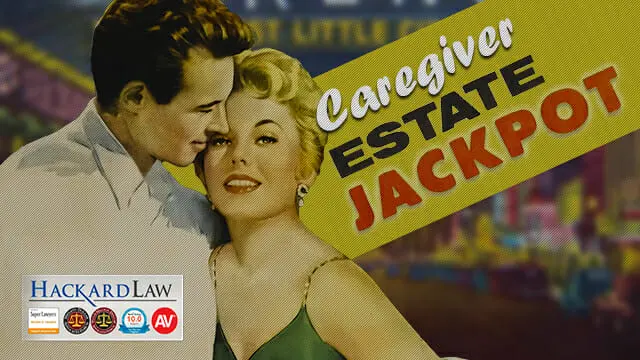
Should a Paid Caregiver Inherit $4 Million? | Undue Influence
Should a paid caregiver inherit 4 million dollars? This story starts off normally enough. A caregiver is hired to care for a 94-year-old woman who is nearly blind. So far, so good.
But just five months in, something extraordinary and suspicious happens. The caregiver is named as the elderly woman’s sole beneficiary, trustee, executor, attorney-in-fact and health care agent.
We’ll call the elder Caroline. And, we’ll call the caregiver Lotto, as in a game of chance. You’ll see how Lotto increased her chances for a jackpot, Caroline’s estate.
Caroline’s twenty-year-old trust was changed shortly before her death. The change wiped out Caroline’s long held plans to benefit her life partner, sister and a niece. Caroline had long been generous, even doting, to all of them. She was a family benefactor and enjoyed the role. This was a role that changed over the last months of her life.
She was ill, isolated and subject to the constant presence of her caregiver. Lotto started her scheme within just a few weeks after she was hired.
The changes were monumental. All family members were to receive nothing from Caroline’s estate. And, if the change was left unchallenged, over $4 million in Caroline’s real estate and cash would go to Lotto, her unskilled homeworker.
Caroline died. Caroline’s life partner, sister and niece soon learned of Lotto’s sudden fortune. I was hired to handle the elder financial abuse part of the case. Other California counsel were engaged to challenge the actions in the probate court.
While Lotto may have been unskilled, she knew how to hire lawyers. By the time that this case was mediated, she’d hired four of them. And, they were good. They knew what they were doing.
This was not an easy case to challenge even if it sounded easy. A 94-year-old woman changes her trust three weeks before she died. Her paid caregiver has a hand in it. Millions of dollars are at stake. When millions are at stake, people fight hard. They can hire high priced and experience litigators. This is no news to us who fight these legal battles.
We fought the battles. Caroline and Lotto’s case settled. I can’t say too much other than that.
I’ve changed the names and circumstances to keep privacy intact. Still, the case that I’ve described in its essentials strongly mirrors the case that we fought.
Drafting lawyer depositions, subpoenas of lawyers’ and bank documents, detailed family histories and social media all become part of the case record. All strongly pointed that Lotto had a hand in the multimillion-dollar changes from beginning to end. And, at the end of Caroline’s life, she signed a document giving everything to “my longtime caregiver and friend.”
Who know how much Caroline remembered of her past life? For her, isolated from all those that she loved, Lotto was all that she knew.
We litigate cases like that of Caroline and Lotto. Caregivers are a suspect class as beneficiaries of trusts and wills. This doesn’t mean that caregiver gifts are always wrong. State laws try to protect elderly makers of trusts and wills by putting caregivers into a class called “prohibited transferees.” Such laws create a legal presumption that the caregiver is named as a beneficiary because of undue influence or fraud.
If challenged in court, the caregiver must overcome this presumption to successfully receive their beneficial interest. There are exceptions to this rule, but the story of Caroline and Lotto is not one of them.
We like to litigate caregiver elder financial abuse cases. We’ve seen too many abuses. The cases must be substantial, and we must think that we can make a significant difference in our representation.
Most of our elder financial abuse, trust, estate and probate litigation practice are filed in California’s largest urban courts, areas including Los Angeles, Orange, Santa Clara, San Mateo, Alameda, Contra Costa and Sacramento Counties. You can see more stories about elder financial abuse on our YouTube channel.
If you’d like more information you can email us at hackardlaw.com or call us at 916 313-3030. We’d like to hear your story.

 (916) 775-8542
(916) 775-8542